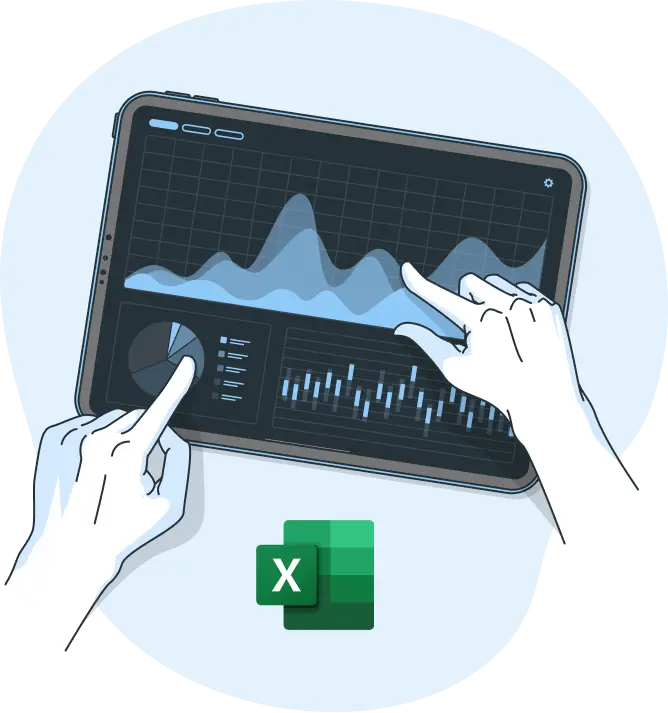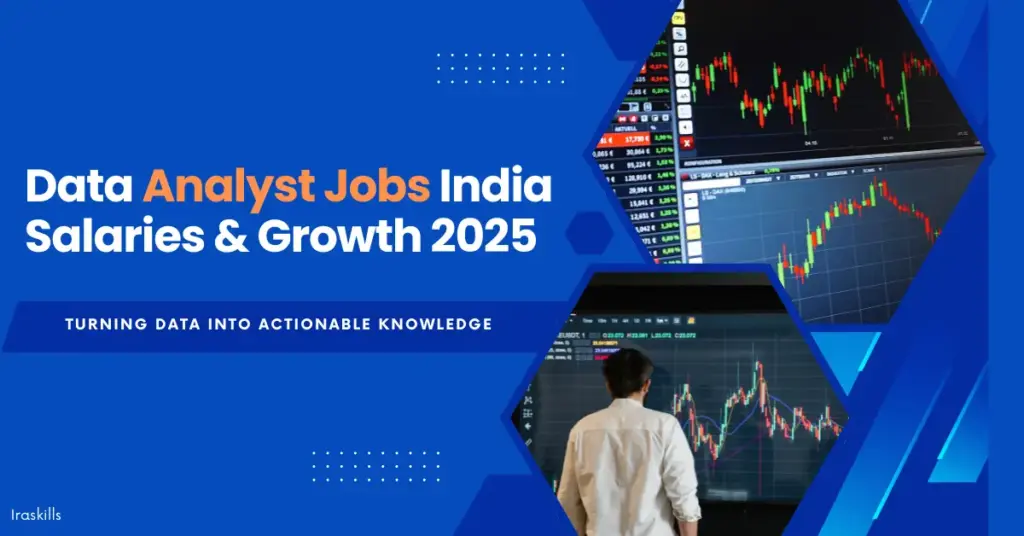To get into this discovery, answer these questions: Do you love numbers? Are you into puzzles and love solving them? Do you like numerical analysis?
If your answer is a ‘yes’ to all of these above questions, then you’re absolutely at the right place, and it’s a possibility that data analytics as a career perfectly fits you!
With 2025, we are entering an era in which the demand for data analysts is going to skyrocket!
Yes, this is no kidding! A projection of 11 million job openings by 2026 has been made, which is no small number. So, if you enjoy playing with raw data and numbers that excite you, this could be the ideal career for you.
Let’s get into this and understand what it takes to become a data analyst and why this field is so promising!

Introduction
What does data analytics involve?
To put it simply, it means converting raw data into valuable insights companies/organizations could use to make beneficial decisions for their business and accordingly create an actionable plan to achieve the respective goals.
Additionally, it has gotten into almost every industry, from finance, healthcare, and marketing to even sports. So, no matter the field, almost everything from businesses and governments to organizations has started to depend on analysts to understand trends, solve problems, and plan strategies for the future.
Now, if so far it is sounding exciting, it’s time to consider data analysis as a career!
7 Factors to Consider Before Becoming a Data Analyst
Before starting the actual process of becoming a data analyst, it’s important to understand the challenges you might face as well as the important skills required.
We have listed down seven factors to help you decide if this role suits you:
- Interest in Problem-Solving
As a data analyst, you will solve real-world problems using data and facts, and so for this reason you should have a leaning towards numbers; otherwise, you may find it boring.
For example, analyzing why sales went down in the last quarter or how to improve customer satisfaction.
Tasks like this should execute you!
- Comfort with Numbers
You don’t need to be a math expert, but a basic understanding of numbers is needed. For example, averages, percentages, and probabilities—these are your all-time tools because they will help you to understand data and create insights. Additionally, do you like working with graphs, charts, and spreadsheets? If yes, welcome to this field! - Technical Skills
What does a data analyst have? Excel, SQL, Python, and Tableau!
To process and analyze data, these are going to be your tools. However, if you’re not familiar with these yet, don’t worry. You can start learning these anytime. Try them out and find out if they interest you!
- Critical and Logical Thinking
This role requires you to question data: Is it accurate? What is missing? What’s causing this pattern?
Critical and logical thinking will help you go deeper and find out the pointers others might miss.
- Communication Skills
Why this? Because your job will also include explaining the analytics to others! So, analyzing data is one thing, and explaining it is another. As a data analyst, you must know both! You need to present complex data in simple language, and so you need to focus on communication skills. - Curiosity
A curious mind plays a very important role. It is not just about the data. But, how curious you are! Why is this happening?” or “How can we do this better?”
Your curiosity must hit you at every point!
- Continuous Learning
This is a field that is continuously evolving and developing. So, staying updated and keeping learning is going to be very important. If you are interested in staying updated on the upcoming technology, then you are a good fit for this.

5 Reasons to Choose Data Analysis as a Career in 2025
Why choose data analytics over other career options? Here, we are listing the top 5 reasons why data analytics is the best career option:
- High Demand: Data analysts are in high demand in all the top companies. This means there are plenty of job opportunities across different industries.
- Good Salary: The job of a data analyst attracts a good amount of money, even though this is relatively a new career option. Further, as one gains experience, their salary also multiplies.
- Work in Any Industry: You can switch industries anytime you want. Why? Data analysts are needed everywhere—from healthcare to marketing, sports to finance. So, you can choose the field that pleases you.
- Flexible Work Options: The good part of being a data analyst is that you can work remotely.Yes, Work From Home—the freedom to work from anywhere is available!
- Make a Difference: Your work will directly impact company decisions. So, your growth can be fast because you will help businesses grow directly by solving their problems and by creating new opportunities.
How Much are Data Analysts Paid?
| Job Role | Experience Level | Average Salary( per year) | Key Responsibilities |
| Entry-Level Data Analyst | Fresher | ₹3.5 – ₹4.5 lakhs | Basic data tasks, creating reports, and identifying trends. |
| Early-Career Data Analyst | 1-3 years | ₹5 – ₹6 lakhs | Managing complex data projects and presenting insights. |
| Mid-Career Data Analyst | 4-6 years | ₹8 Lakhs | Leading projects, mentoring junior analysts, and strategic input. |
| Senior Data Analyst | 7-9 years | ₹10 Lakhs | Managing critical data initiatives and business strategy alignment. |
| Data Analyst Manager | 10+ years | ₹18+ Lakhs | Overseeing data teams and aligning projects with business goals. |
In-demand job Role For Data Analyst in 2025.
| Industry | In-Demand Roles |
| Technology & IT | Data Scientist, Data Engineer, Business Analyst |
| Healthcare | Data Analyst, Operations Analyst |
| E-commerce | Marketing Analyst, Product Analyst |
| Finance | Financial Analyst, Risk Analyst |
| Retail | Data Analyst, Operations Analyst |
| Entertainment | Marketing Analyst, Product Analyst |
| EdTech | Data Analyst, Marketing Analyst |
Planning to take a step in the field of Data Analysis
Keep these pointers in mind:
- Learn the Basics: Start with basic math and focus on building a strong foundation in math and coding. Take time to understand available data and make effective decisions out of it.
- Build Technical Skills: Focus on tools like SQL and Python and data visualization tools like Power BI or Tableau.
- Work on Real Projects: Apply your skills by working on real-world data available in the market. This will give you more clarity on how to make and take decisions from the data.
- Create a Portfolio: Gain real work experience and showcase your work on platforms like Upwork, Fiverr, or a personal website. To get clarity on how things work.
- Network: Join data analysis communities on LinkedIn, attend webinars and seminars, and build networks through online sources.
- Stay Updated: Subscribe to blogs, follow industry leaders, and never stop learning. You always need to stay updated about all new features.
- Mentorship: A mentor can guide you through all the steps of your career. The mentors play a crucial role in guiding you through all the phases that you are going to face in your journey to become a data analyst.
FAQs About Data Analysis As a Career
- Do I need a degree to become a data analyst?
No, it is not required much! However, a person should have a detailed knowledge of the basic terminology used in data analysis. With the help of practical learning, working on real-time projects helps a person gain some practical knowledge, which is very much necessary. - What tools do I need to learn?
Start with the basics: Excel, SQL, and Python Also, learn data visualization tools like Tableau or Power BI to present insights effectively. - Is coding required for data analysis?
Yes, basic coding knowledge can be a big advantage, especially with Python or R. However, it’s not always important for entry-level positions. The important thing is knowing how to use the tools that help you analyze and interpret data. - What industries hire data analysts?
Data analysts are needed in almost every industry, from healthcare and finance to marketing, sports, and e-commerce. Businesses everywhere need them to make informed decisions. They need a person to handle the data and help them to make good, effective decisions in their field.
Conclusion
Now is the best time to choose a career as a data analyst. This field offers numerous opportunities and even the flexibility to work from anywhere. Starting packages are attractive for both freshmen and experienced professionals.
Start developing the skills needed for this field and kick-start your journey today!

 Login
Login










